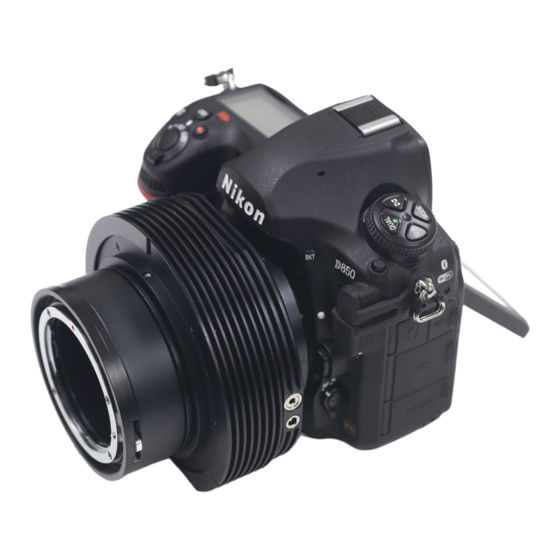Nikon D850 User Manual - Page 7
Browse online or download pdf User Manual for Film Camera Nikon D850. Nikon D850 10 pages. Useful features
Also for Nikon D850: Technical Manual (46 pages)

CENTRALDS ASTRO D850 USER GUIDE
* Cooling Module of Astro D850 has no ON/OFF switch. When you connect the DC power to camera,
cooling module become ON at the same time.
* Astro D850 has no Temperature controller. When cooling get reach to stable condition the CMOS
temperature will be it's maximum cooling state.
*PS1204 is a DC step down adapter for TEC module and it's adjusted for maximum cooling performance
of heatsink and cooling fan. Please do not use DC power supply of other companies.
*Back Focus Distance of Astro D850 is 44mm(CM2C) /46.5mm(CM2N), These are same to Canon
EF-mount or Nikon F-mount, and adjusted at the condition of 2mm thickness glass filter installed at the
drop-in filter holder. If you take the shots with the camera lens, in case of no filter in drop-in filter holder,
infinity focusing error will be occurred. We recommend to install a filter (2~3mm thickness) into drop-in
filter holder always.
(Recommended filters: Hoya MC Clear, Baader UV/IR cut, IDAS LPS P2 etc )
*In case of Baader 2" filters, you can use only Low Profile Filter Cell(LPFC) products.
*TEC cooling module is more efficient when the ambient temperature is high but the efficiency is lower
when the temperature is low in the winter. This is due to the electricity consumption per temperature
characteristics of the Peltier elements which is one of the most important parts in the TEC cooling module.
As a result, the cooled image sensor temperature may not reach to max cooling temperature of [product
information] in the winter season.
*The camera temperature showing in BackyardNikon or other Astro imaging programs is not the actual
sensor temperature but the temperature at the temperature sensor installed on the PCB circuit board
placed behind the image sensor.
**The temperature value displayed at DTH-1 is from the temperature on cold finger and it's near to real
CMOS temperature and the temperature that Astro imaging programs is displaying (from Nikon exif data)
is about 3-7C higher than this value.
* If the camera is exposed to the air outside with the cooling module off for extended period of time, the
camera can be internally damaged due to problems such as short circuits caused by condensation.
* If you have to leave the camera outside for extended period of time, cover the camera with the dew
shield cover as soon as turning off the cooler.
PAGE
7 10
/
CENTRALDS
